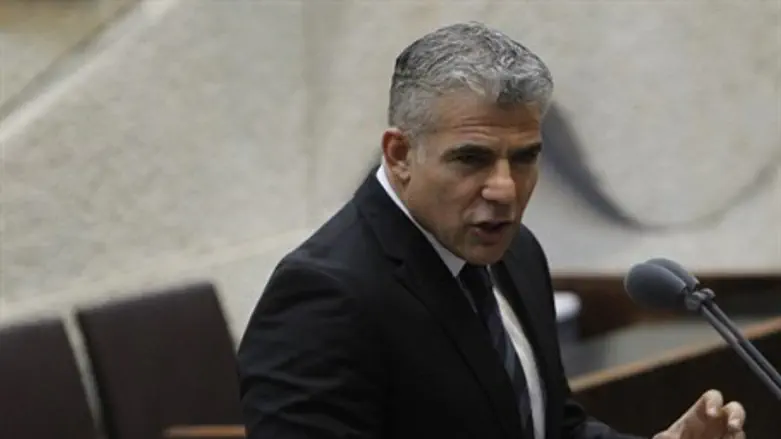
Jerusalem is not on the table in Israel’s negotiations with the Palestinian Authority, Finance Minister Yair Lapid has declared.
Lapid, head of the Yesh Atid party, spoke to Kol Yisrael (Voice of Israel) radio following reports that Israel’s chief negotiator, Justice Minister Tzipi Livni, is seeking to offer the PA control over several Jerusalem neighborhoods, as well as joint control over other parts of the capital.
The city of Jerusalem will not be divided, Lapid stated.
Jerusalem is the “founding ethos” of the state of Israel, and must remain Israeli, he explained. The PA must come to terms with this, he continued, saying, “If the Palestinians want a state, they need to know there’s a price for that. They won’t get everything they want.”
Earlier, Minister Gilad Erdan expressed a slightly different take on things in an interview with Kol Yisrael. Erdan said he was not surprised to hear that Israeli and PA negotiators were discussing the status of Jerusalem, and pointed out that government leaders had stated prior to talks that no issue would be left off the table.
However, like Lapid, Erdan expressed belief that Jerusalem will remain a united city under Israeli sovereignty.
The PA has insisted on receiving all land east of the 1949 armistice line, including the eastern part of Jerusalem and the Temple Mount – Judaism’s most sacred site.
While Lapid insisted on Israeli sovereignty in Jerusalem, he said he does support the “two states for two peoples” solution, which would mean putting a significant part of the land of Israel under PA control, to be used to establish a new Arab state.
Splitting the land of Israel will be a painful process, he warned, and the need to evict tens of thousands of Israelis – or more – from their homes in Judea and Samaria could split the nation.
When it comes to the point of eviction, the odds are good that the government will call for new elections, or for a national referendum, in order to get the nation’s support, he added.
In 2005, the government – led by then-Prime Minister Ariel Sharon – evicted nearly 10,000 Israelis from their homes in Gaza and northern Samaria under the “Disengagement” plan. The highly controversial plan became increasingly unpopular in hindsight as Hamas rose to power in Gaza and used the territory to launch multiple battles against Israel, and to fire rockets on major Israeli cities.
Adding to backlash against the plan was the fact that the government largely failed to resettle those who were forced from their homes. As of mid-2013, approximately half of former Gaza resident Israelis were still living in temporary housing. Many of the business owners who were among the expellees are still operating from temporary office space, and several are currently facing eviction.